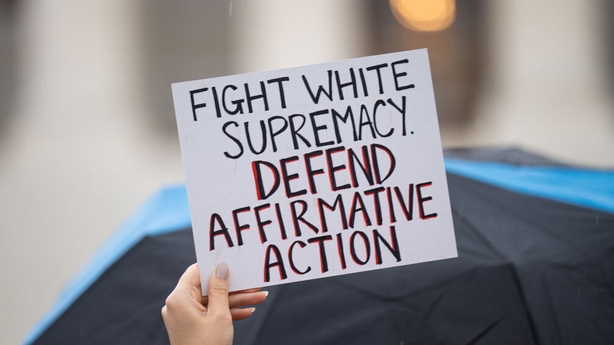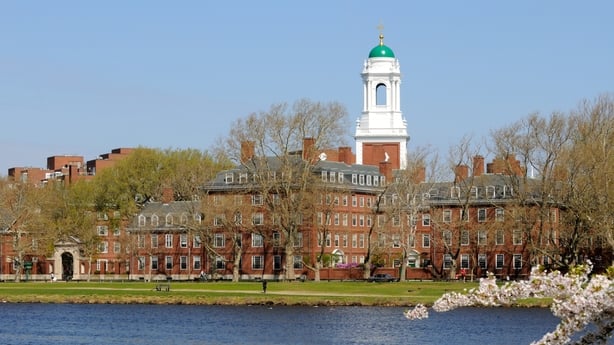The US Supreme Court has struck down race-conscious admissions programmes at Harvard University and the University of North Carolina (UNC), effectively prohibiting affirmative action policies long used to raise the number of Black, Hispanic and other underrepresented minority students.
In a decision that will force many American colleges to overhaul their admissions policies, the justices ruled in favour of a group called Students for Fair Admissions, founded by activist Edward Blum.
The group appealed lower court rulings upholding programmes used at the two prestigious colleges to foster a diverse student population.
Chief Justice John Roberts said: "Harvard and UNC admissions programmes cannot be reconciled with the guarantees of the Equal Protection Clause," referring to the US Constitution's promise of equal protection under the law.
In major rulings last year with far-reaching societal implications also spearheaded by conservative judges, the Supreme Court overturned the 1973 Roe v Wade decision that had legalised abortion nationwide and widened gun rights.
Justice Roberts said that any student "must be treated based on his or her experiences as an individual not on the basis of race.
"Many universities have for too long done just the opposite.
"In doing so, they have concluded, wrongly, that the touchstone of an individual's identity is not challenges bested, skills built, or lessons learned but the colour of their skin.
"Our constitutional history does not tolerate that choice."
Colleges, Justice Roberts added, may still consider student writings in personal essays about "how race affected his or her life, be it through discrimination, inspiration, or otherwise."
But "universities may not simply establish through application essays or other means the regime we hold unlawful today."

Affirmative action had withstood Supreme Court scrutiny for decades, most recently in a 2016 ruling involving a white student, backed by Mr Blum, who sued the University of Texas after being rejected for admission.
The court has shifted rightward since 2016 and now includes three justices who dissented in the University of Texas case and three new appointees by Republican former president Donald Trump.
He described today's ruling as "a great day for America".
President Joe Biden said he "strongly" disagrees with the ruling.
Many institutions of higher education, corporations and military leaders have long backed affirmative action on campuses not simply to address racial inequity and exclusion in American life but to ensure a talent pool that can bring a range of perspectives to the workplace and the US armed forces.
Liberal Justice Ketanji Brown Jackson, the first black woman to serve on the court, wrote in a dissent: "With let-them-eat-cake obliviousness, today, the (court's) majority pulls the ripcord and announces 'colorblindness for all' by legal fiat. But deeming race irrelevant in law does not make it so in life."
Justice Jackson did not participate in the Harvard case because of her past affiliation with the university.
Liberal Justice Sonia Sotomayor wrote in a dissent that the decision "subverts" the constitutional guarantee of equal protection and further entrenches racial inequality in education.
"Today, this court stands in the way and rolls back decades of precedent and momentous progress," she said in a dissent joined by Justice Jackson and Liberal Justice Elena Kagan.
Justice Sotomayor added that the "court cements a superficial rule of colorblindness as a constitutional principle in an endemically segregated society where race has always mattered and continues to matter."

Mr Blum's group in legal actions filed in 2014 accused UNC of discriminating against white and Asian American applicants and Harvard of bias against Asian American applicants.
Students for Fair Admissions alleged that the adoption by UNC, a public university, of an admissions policy that is not race neutral violated the guarantee to equal protection of the law under the Constitution's 14th Amendment.
The group contended that Harvard, a private university, violated Title VI of the Civil Rights Act of 1964, which bars discrimination based on race, colour or national origin under any programme or activity receiving federal financial assistance.
According to Harvard, around 40% of US colleges and universities consider race in some fashion.
Harvard and UNC have said they use race as only one factor in a host of individualised evaluations for admission without quotas - permissible under previous Supreme Court precedents - and that curbing its consideration would cause a significant drop in enrollment of students from under-represented groups.
Critics, who have tried to topple these policies for decades, argue these policies are themselves discriminatory.

